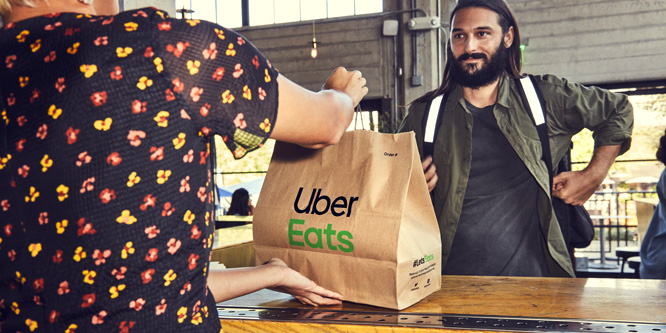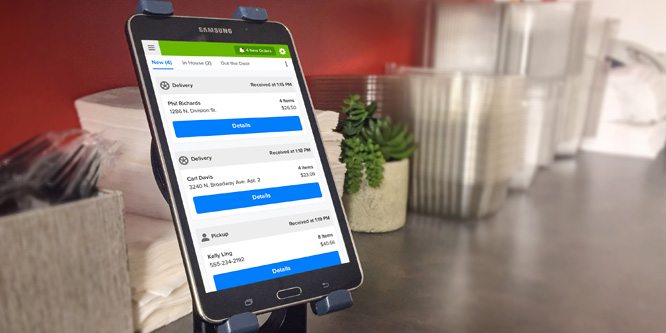
Photo: Uber Eats
Would an Uber/Grubhub merger be good for restaurant meal delivery?
Uber is reportedly in talks to acquire Grubhub in what promises to reshape the restaurant meal delivery space.
Among the potential benefits of a combination:
- Market leader: A combination of Uber Eats and Grubhub would have about 55 percent share of food delivery in the U.S., according to Wedbush Securities. DoorDash would be second at 35 percent, with Postmates the fourth major player.
- Food delivery growth: Uber’s main ride-hailing business has essentially dried up amid shelter-at-home calls while food delivery has surged as consumers stay home and many restaurants remain shut down.
- Profitability: All four major food delivery players lose money. To some analysts, the costs of building out delivery and luring customers leaves room for only two major delivery players. Dara Khosrowshahi, Uber’s CEO, told investors on May 7, “There is a bunch of consolidation happening on a global basis where bigger players can not only provide better service for restaurants and consumers, but can provide a better service kind of on an economic basis that is sustainable.”
Grubhub had retained advisers in January to consider a possible sale well before the pandemic threat was fully realized, reported The Wall Street Journal.
The deal could fall apart over valuation and significant antitrust concerns, particularly as many local restaurants fight for survival in the face of the pandemic.
The pandemic crisis could present opportunities with Olive Garden and Waffle House using third-party delivery for the first time, although Cheesecake Factory, Chipotle and Applebee’s have built their own carryout operations to avoid middlemen costs.

Gig-economy companies may face more costs going forward as legislators are pushing for improved working conditions.
The crisis has also exacerbated tensions over the fees charged to restaurants for delivery. A number of cities are imposing or debating caps on such fees during the pandemic. Grubhub CEO Matt Maloney told investors on May 6, “We are doing everything we can imagine to help restaurants because, at the end of the day, the restaurants’ business is our business.”
- Uber Technologies Makes Takeover Approach to Grubhub – The Wall Street Journal
- Uber Said to Be in Talks to Acquire Grubhub – The New York Times
- Uber offers to buy Grubhub, plans to sell $900 million in bonds – CNBC
- Uber Announces Results for First Quarter 2020 – Uber
- Grubhub Reports First Quarter 2020 Results – Grubhub
- America Is Stuck at Home, but Food-Delivery Companies Still Struggle to Profit – The Wall Street Journal
Discussion Questions
DISCUSSION QUESTIONS: Would an Uber and Grubhub merger be a positive development for restaurants and consumers? In what ways do you expect the pandemic to impact the restaurant delivery space?


Less competition could mean increased delivery costs. I believe that would lead me to do curb service or to go to the restaurant instead.
The potential merger of Uber and Grubhub is a logical strategy as there are synergies. Even before the pandemic, Uber and Lyft drivers were also doing deliveries for Grubhub and DoorDash, as some figured out that it was the best way to make the most money during dinner hours. They avoided the traffic and wait times associated with airport pick-up and drop-offs, by staying in a neighborhood and doing multiple food deliveries in an hour. A combined Uber and Grubhub team has synergies.
The pandemic has inspired many consumers to try food delivery and some of those consumers may find that they really appreciate the convenience and it will become a habit. Food delivery will be a larger share of most restaurants’ business going forward.
Everyone in the value chain is losing money – restaurants get margins eaten away. Delivery companies can’t make do with the fees that they get. Drivers don’t make minimum wages for the hours they put in. Consumers are getting more value than they have been paying for, and that value is subsidized by food delivery companies and restaurants.
The overarching hope is that end-consumers will buy more and buy frequently. This is important because the unit economic model is still not profitable. That means adding more consumers will actually lead to more losses – at least until the unit economic model is profitable.
And when does the unit economic model become profitable? When the delivery costs as a percentage of the food price come down.
Long story short – This is still a market share play for Uber. But they won’t be operationally profitable anytime soon. They can hope that their investors are patient and will pump in more money to fund the losses. For consumers, there is no threat yet in terms of higher fees.
Suresh, I have been saying this for years. You are correct with your insight on this subject. Nothing is free. The consumer has been led to believe that dinner should be dropped off for a couple of dollars, and that should be just fine. I studied this for several years. If the true cost of delivery was added in where profits are assured, the model would collapse, as everyone is waiting for the other to charge more for this and no one has blinked. Reality will take over as investors will quit throwing their money away, knowing profits and ROI are non existent.
I’m not sure that such a merger is going to fix the mess that third-party delivery (3PD) is right now. With a high take rate and limited data-sharing, this is not currently a long-term strategy for restaurants. In the meantime there are substantial gaps that need to be addressed that currently undermine the customer experience and can erode a loyal customer base:
We are guiding firms through many of these challenges now. I would expect a merger, at least in the short to intermediate term, to take the focus away from solving many of these challenges.
This only makes sense if the underlying economics for food delivery work. There have been many articles written about the companies mentioned losing money and hoping one day that they can do enough volume and/or that there are changes in the model to allow them to make money.
This merger could be good for the restaurant delivery business but bad for the restaurants. There have been articles about the cost to the restaurants that utilize third-party delivery services especially if the customer contacts them rather than placing their order with the restaurant directly. An example would be in Chicago where the Mayor got involved and mandated all their receipts list all the fees and other charges.
I expect more people will become comfortable with curbside pickup service. I have seen improvements in how this is being handled by the restaurants we patronize, plus it is a chance to get out of the house.
I can’t see any way that an Uber/Grubhub merger is good for restaurants. The fee structures they have created — while misleading consumers to believe that it shouldn’t cost much to get food hand delivered to their home — are punitive to restaurants. We can predict it would only get worse when too much power is consolidated in one company.
A few weeks back I wrote a blog post pondering why these new “tech flavored” efforts like UberEats or GrubHub are based on the idea of delivering premium service at a discount price. Is it possible there simply isn’t demand unless they lose money?
If this is true, it’s fake demand and not a market with value to be served.
I’ll repeat what I said on the previous merger question (and I suspect I’ll be repeating on every other one): unless there’s some particular advantage, like geographic expansion or reducing redundancy, I’m not fond of them. I don’t see any such advantages here, other than “sparing” restaurants/consumers a little bit of choice. And honestly, I don’t see what the advantages even COULD be: this is a very labor intensive business whose workforce naturally adjusts itself to demand.
Im not convinced that combining two companies that are currently losing money — while charging restaurants hefty fees for delivery — is a good move at all. Until there is a better business model, home delivery will continue to be a profit-eating endeavor.
I just don’t know if food delivery as a standalone business model. Unlike Amazon.com which can scale with warehouses and efficient distribution (down to owning the trucks and planes), by nature, food delivery services rely on the delivery contractors and more deliveries do not increase the efficiencies. Also, as we learnt through the COVID-19 crisis, restaurants are low margin that are financially susceptible to downturn and consumers, once pinched with job loss, will decrease food deliveries.